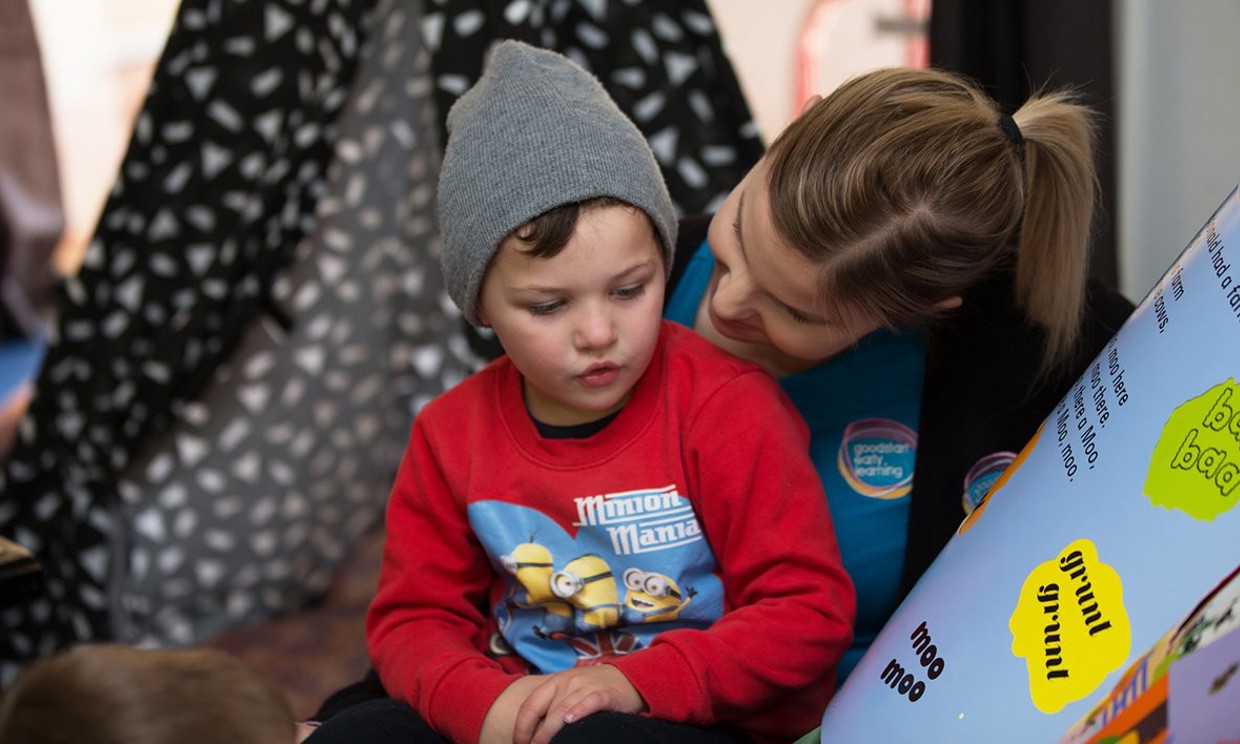Developing literacy skills in a child’s first five years is crucial to their ability to perform in the world in later life.
In adult life being literate is a requirement for almost all forms of employment and statistics show that that low levels of literacy make one in three Australian adults vulnerable to unemployment, social exclusion and even poor health.
We sometimes confuse literacy as being nothing more than learning to read and write, but literacy skills are actually the foundations for learning about and making sense of the world around us. This includes things like being able to understand and interpret information, signs and symbols, and being an effective communicator – all crucial to success in life.
Getting these skills off to a strong start is vital and it’s why centres like Goodstart Salisbury North continually look for new ways to use both intentional teaching and play-based learning to help children build literacy levels.
“Intentional teaching is about creating planned sessions or experiences to help children extend their understanding of letters, numbers, sounds, rhyming and so on,” explains Centre Director, Nicole Van Nistelrooy.
“Often we’ll use group sessions for this, which can be as simple as being together and singing songs. In these sessions children will engage with us in conversation, learn about the words and rhymes and incorporate physical movements.”
While intentional teaching sessions are important, Nicole says that play-based learning is also crucial for literacy development as children are highly engaged and more likely to pick up incidental learnings as they explore and play.
“When teaching literacy during play, the focus is on building learnings into the activity the children are engaged in.
“For example, if a child is engaged in dramatic play and loves to dress up, we’ll have conversations with them and ask questions during their play that provokes their thought.
“We may only ask four or five questions and then leave lots of space in between, but by asking them about what they’re doing, where they’re going and what sort of role they’re playing, it gives them an opportunity to extend their thinking and learn.”
Parents are a child’s most important teacher, and Nicole recommends parents spend time with their children in fun activities that help to further develop their skills. Activities to consider include:
In adult life being literate is a requirement for almost all forms of employment and statistics show that that low levels of literacy make one in three Australian adults vulnerable to unemployment, social exclusion and even poor health.
We sometimes confuse literacy as being nothing more than learning to read and write, but literacy skills are actually the foundations for learning about and making sense of the world around us. This includes things like being able to understand and interpret information, signs and symbols, and being an effective communicator – all crucial to success in life.
Getting these skills off to a strong start is vital and it’s why centres like Goodstart Salisbury North continually look for new ways to use both intentional teaching and play-based learning to help children build literacy levels.
“Intentional teaching is about creating planned sessions or experiences to help children extend their understanding of letters, numbers, sounds, rhyming and so on,” explains Centre Director, Nicole Van Nistelrooy.
“Often we’ll use group sessions for this, which can be as simple as being together and singing songs. In these sessions children will engage with us in conversation, learn about the words and rhymes and incorporate physical movements.”
While intentional teaching sessions are important, Nicole says that play-based learning is also crucial for literacy development as children are highly engaged and more likely to pick up incidental learnings as they explore and play.
“When teaching literacy during play, the focus is on building learnings into the activity the children are engaged in.
“For example, if a child is engaged in dramatic play and loves to dress up, we’ll have conversations with them and ask questions during their play that provokes their thought.
“We may only ask four or five questions and then leave lots of space in between, but by asking them about what they’re doing, where they’re going and what sort of role they’re playing, it gives them an opportunity to extend their thinking and learn.”
How can parents help children develop literacy skills at home?
Parents are a child’s most important teacher, and Nicole recommends parents spend time with their children in fun activities that help to further develop their skills. Activities to consider include:
- Reading books to your child, and asking them questions as you read such as “what could happen next?”
- Encourage conversations with your child and be an example of how to listen and take turns speaking
- Take the time to listen to your child’s stories
- Include your child in appropriate family discussions
- Lead by example and allow your child to see you regularly reading newspapers, books and magazines
- Encourage your child’s reading by showing them how to find information that is of interest to them. This may include television guides, dictionaries, cookbooks and the sports pages of newspapers.
- Play word-oriented games with them such as Scrabble Junior
- Have plenty of books appropriate to your child’s reading or interest level in the house and allow your child to choose what they read
- Make sure your child has access to writing materials, such as paper, pens, textas and pencils. Where possible, let them choose their own writing material and create a special place for their ‘writing’.
- Ask your child to make and decorate cards for birthdays, to say ‘thank you’ or for other celebrations and occasions


